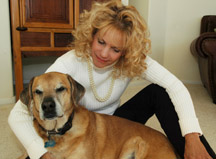Lt. Costello (Name and location changed. The story is true.)sat behind a large, conspicuously clean desk at the Tarrytown Police Station in N.Y. He was cool, composed, and seemed as uncluttered mentally as he was physically. The awards on his book cases and certificates on the wall attested to a long, successful career. "I paid my dues," he smiled as he scanned the room and the work it all represented. As he saw it, however, his career really started in Vietnam when he was only a teenager serving in the U.S. Army. It was there, assigned to an armored car division sent deep into the jungle, that he learned what it took to survive physically, mentally, and emotionally.
He was on a mission in the Delta, it was summer and the temperature outside had reached upwards of 115 degrees Fahrenheit before noon. Inside the tank it was at best unbearable under normal conditions. On one particular day he still remembers with stunning clarity, it was life-threatening.
 "It must have been 130 or more inside. It was hot in a way I had never experienced before. I couldn't stop sweating, couldn't drink enough, couldn't just get up and go to the bathroom. I was burning up. I don't mean that metaphorically. I was literally burning up and I had to lower my body temperature somehow or I was going to die. Funny how it didn't scare me. It was just as clear to me as the coffee in front of me now. It was a fact. I had no air conditioning. I couldn't get out of the tank. There was nowhere to go except a POW camp, if I was lucky enough to get caught and not killed right away. I remember thinking that I should have been panicking. Instead, I was utterly, crystal clear. It was in the space of such a small moment that I realized it was completely up to me. Whether I survived or not was between me and my own mind." The lieutenant sat forward, his body compressed with the intensity of the experience, still vivid in him.
Â
 "For some reason, I thought about something I'd heard about some monks in the Himalayas, how they went outside in sub-zero temperatures and howling winds to meditate and never suffered any ill effects. They raised their own thermostats. And I figured if they could do it that way, I could lower it. To this day I don't know exactly what I did or how I did it, but I imagined cool water inside me and around me, like I was dunking myself into a cooler filled with ice or skinny dipping in the lake back home. And hell if it didn't work. I'm here. I never forgot that," he sat back. "This," he pointed to his head, "was my greatest weapon of all. And it has served me ever since, no matter what or where the battle."
Surviving A Crisis
Since 9/11 the two ratings-building spin words are "survival" and "emergency." Today, Americans are fed a regular diet of security alerts, color-coded for those who need the visual aids, preparedness strategies, complete with thousands of products one can buy for only $49.95 plus shipping and handling, and countless medications courtesy of the pharmaceutical industry to help us all manage the resulting anxiety, depression, and despair.
This is not all that different from the build-a-bunker-mentality of the anti-communist frenzy during the cold war and the subsequent pill-popping that ensued. We had to protect ourselves then no matter what it took. And we feel the same urgency now.
But most of the people who are building bunkers today, anxiously watching the colors flip back and forth from orange to red alert status, packing enormous first aid kits when they go hiking on local trails, or getting into armored tanks that can put holes through mountains are "prepared" in almost every way except what scientists are now coming to believe is the most important way.
And that is the way of the mind. The images we hold in our minds seem to be held in our bodies as well. What we think is what we are. What we feel determines how we heal.
Images in The Mind Create Bodily Changes




